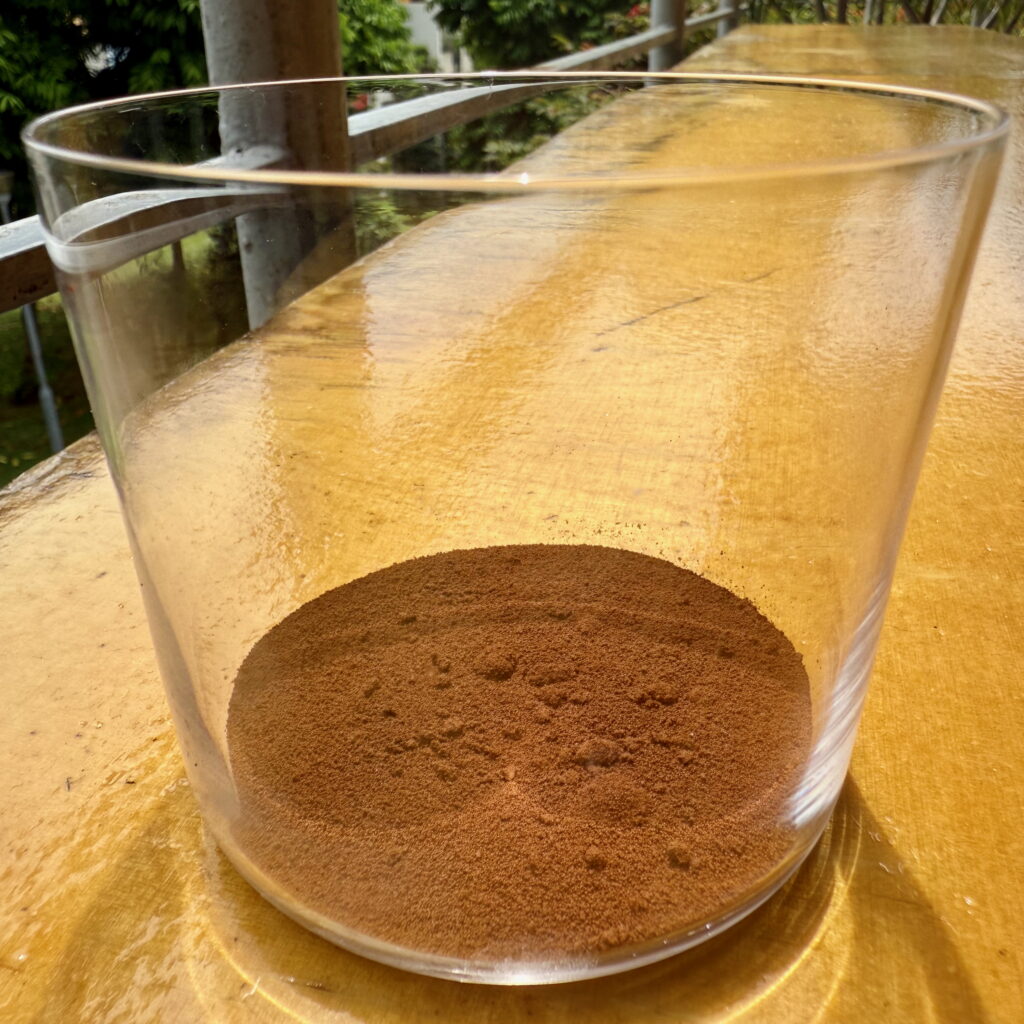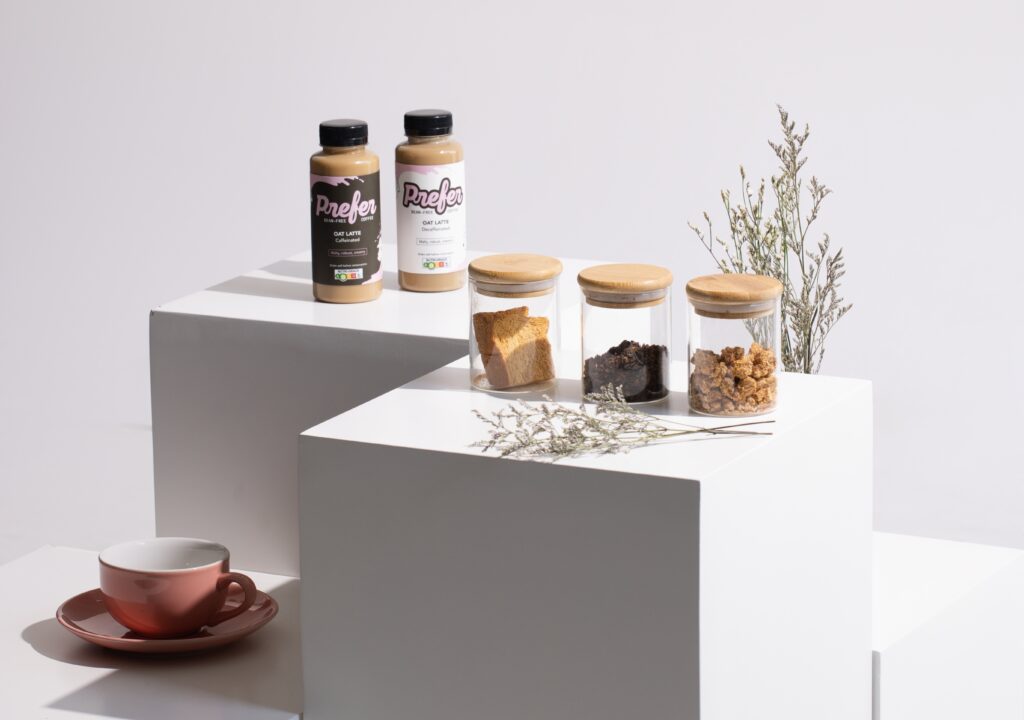
Singaporean food tech firm Prefer has unveiled a bean-free soluble powder positioned as a “coffee extender”, in an approach reminiscent of blended meat.
When it comes to decarbonising the food system, working with – not against – the polluting industry might be the best way to mitigate it.
That is, anyway, the idea that drives blended meat, a class of products that combine animal proteins with plant-based ingredients to reduce emissions, improve health, and alleviate concerns from the incumbent livestock sector. It also helps the uptake of animal-free products, without compromising the taste that consumers hold dear.
More and more companies and retailers are coming up with such products. And it’s not just meat – you can now also buy hybrid milk and cheese.
Others are applying that concept to another high-emission industry: coffee. Producing a kg of coffee beans generates more greenhouse gases than the same amount of poultry and pork combined, while a cup of joe requires 140 litres of water.
Coffee and climate change have a reciprocal relationship. The latter has left 60% of coffee species endangered and the area suitable for cultivating arabica shrinking. Extreme-weather-induced crop failures and shortages pushed up arabica prices by 80% last year, with wholesale prices reaching a nearly 50-year high. And this February, coffee futures in New York hit an all-time high of $4.34 per pound.
It has spurred food tech startups to develop bean-free alternatives that can complement commodity coffee in a wide range of applications. ‘Complement’ is the key word here: most of these firms aren’t looking to disrupt the industry. They’re here to support it, as Jake Berber, co-founder and CEO of Singapore-based player Prefer, suggests.
“There is a parallel to blended meat,” he tells Green Queen. “It is not about replacing the original; it is about keeping the experience while solving for price, sustainability, and scale. That is how we think the future of coffee will look, at least at the mass market level.”

Why Prefer opting to blend, rather than replace, coffee
Berber is speaking to Green Queen just after announcing the launch of Prefer’s soluble beanless coffee powder, a climate- and wallet-friendly “coffee extender” designed to be blended with its conventional counterpart in all industry applications.
The innovation is built for instant coffee sachets, ready-to-drink beverages, flavour extracts, and coffee concentrates, among other uses. In a video accompanying the launch, the Prefer CEO argues that the industry’s current path will make coffee a luxury item only for the rich.
“Coffee prices are rising, supply chains are fragile, and quality increasingly inconsistent. The impact is being felt everywhere: consumers and the world’s largest food and beverage companies,” he says in the 90-second clip.
“We are focused on solving a real problem. The problem is that coffee is getting more expensive and consumers are feeling it,” Berber elucidates in his chat with the publication. “They aren’t asking for an alternative. They just want their coffee to taste the same and cost what it used to.”
He adds: “So we decided to blend. Actually, it was our customers who came up with the idea, so we can’t take credit for it. By combining traditional coffee with Prefer, we help brands reduce costs without changing the flavour. It solves for a consumer pain point, protects margins, and reduces climate impact.”
Several beanless coffee counterparts are taking the same approach. In the US, Atomo launched a 50:50 blend last year, combining its upcycled alternative with medium-roast coffee that consumers preferred over Starbucks.
Belgium’s Koppie, meanwhile, is working with coffee roasters, “which makes consumer adoption easier and is closer to their own core and capabilities, just like we’re seeing happening in meat and dairy at the moment”, its co-founder told Green Queen last month.
Recent research by ADM found that while only 16% of global consumers currently consume meat extenders, the perception of these products is “much more positive than expected”. Could the same be true for coffee?
With $15M in potential supply deals, Prefer eyes international expansion

Founded in 2022 by Berber and CTO Ding Jie Tan, Prefer upcycles food industry waste – like surplus bread, okara (the leftover pulp from tofu production), and brewers’ spent grain – and ferments them with food-grade microbes. These ingredients are then roasted and ground just like coffee beans, with the process unlocking the same aroma volatiles found in coffee.
In addition to the soluble powder, it also sells roasted and ground coffee, concentrates, and ready-to-drink lattes. The products are stocked in 75 locations across Singapore, and will be added to at least another 25 by the end of the year.
Berber says the soluble beanless coffee powder is 50% cheaper than arabica on average, with an 85% lower carbon footprint, helping it unlock partnerships with food and beverage giants. Prefer has already signed $15M in non-binding offtake agreements for multiple ingredients, from the soluble powder to its roasted and ground option.
“That said, the majority of demand is for the soluble format, which is the format our B2B partners are looking for,” he notes. “Most of our MOUs are focused on instant coffee and ready-to-drink formats. We are also developing toll manufacturing and licensing deals in new markets. Nothing is finalised, but it is how we plan to scale without taking on heavy capex.”

The company, which raised $2M last year to build a larger pilot plant and is also working on bean-free chocolate, plans to commercialise the soluble powder this quarter. One of the first products to leverage this would be Melvados, which recently launched a dairy-free coconut latte ice cream using Prefer’s coffee alternative.
“They initially launched using our roast and ground product, as that was what we had available at the time. Going forward, they are transitioning to our soluble coffee,” says Berber, calling it a “clear example of the kind of product we are building, where Prefer is used as a hero ingredient inside a finished consumer item.”
The MOUs also signal its international ambitions, with most of the supply agreements outside Singapore. “We’ve been quite vocal about our active effort to expand across Asia,” says Berber. “The Philippines is likely next, but our model gives us flexibility. We scale with local manufacturing, so the next market depends on where the offtake is strongest.”
The post With Its Newest Product, Beanless Coffee Prefer Takes A Leaf Out of Blended Meat appeared first on Green Queen.
This post was originally published on Green Queen.